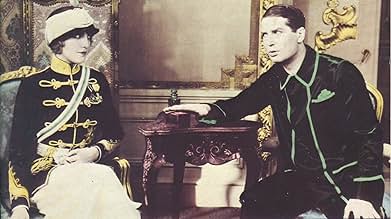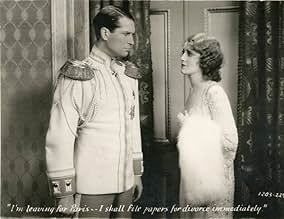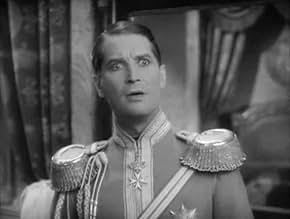IMDb-BEWERTUNG
7,0/10
2736
IHRE BEWERTUNG
Die Königin des mythischen Sylvania heiratet einen Höfling, der sein neues Leben als unbefriedigend empfindet.Die Königin des mythischen Sylvania heiratet einen Höfling, der sein neues Leben als unbefriedigend empfindet.Die Königin des mythischen Sylvania heiratet einen Höfling, der sein neues Leben als unbefriedigend empfindet.
- Für 6 Oscars nominiert
- 4 Gewinne & 6 Nominierungen insgesamt
Carl Stockdale
- The Admiral
- (as Carlton Stockdale)
Albert De Winton
- Cabinet Minister
- (as Albert de Winton)
Ausgewählte Rezension
The Love Parade which was Maurice Chevalier's second feature film is as fresh today as it was in 1929 when it garnered a whole flock of Academy Award nominations. It was Paramount's prestige film of the year, in fact I'm not sure if any other Paramount features got any nominations for anything that year.
It was Ernst Lubitsch's first sound feature film and apparently the man with the famed Lubitsch touch hit the ground running in the new medium with a bunch of players who were also fresh to cinema because of the coming of sound. This was Jeanette MacDonald's film debut and while she's not billed over the title as Chevalier was, her part is every bit as important and as big as his.
Maurice Chevalier has been cutting a wide swath among the ladies of Paris where he's attached to the embassy of Sylvania. So much so that he's been recalled to Sylvania for a reprimand or so he thinks.
Jeanette MacDonald is the new young Queen of Sylvania and she's got to marry for reasons of state. As did many a female monarch, British ones like Victoria, Anne, and the two Marys all took husbands for reasons of state and the method they chose them was as much political as anything else. Only Elizabeth I managed to escape the marriage obligation.
While her diplomats look askance on Chevalier's romantic antics, Jeanette sees in him one grand candidate for marriage. If she's got to get married for reasons of state by God she's going to pick a husband who's going to be ready to romp at a royal command.
The Love Parade's musical score was written by Victor Schertzinger and Clifford Grey. The first notes Jeanette MacDonald ever sang on screen were from her hit song, Dream Lover. It's not the same song as Bobby Darin had a hit in the Fifties from. Film fans will recognize it as the flying theme that Cecil B. DeMille used as background music when Betty Hutton and Cornel Wilde were on the trapeze in The Greatest Show On Earth. Jeanette also sings March of the Grenadiers as she reviews her palace guard.
Chevalier's two big numbers were Paris Stays The Same and My Love Parade from whence the title comes. Both were written to suit his grand boulevardier style. Some comic numbers were written for Lupino Lane and Lillian Roth who are the second leads. Lupino is Chevalier's orderly and Roth is one of her maids. They make a cute pair with their impish behavior, aping their masters.
The Love Parade got six Oscar nominations, but did not win in any category and the categories were a lot fewer back in the day. It was up for Best Picture, Best Director, Best Actor for Maurice Chevalier, Best Sound Recording, Best Art Direction, and Best Cinematography. It also has a lot fewer overacted performances that were the norm in those early sound days. It was as if Ernst Lubitsch instinctively knew what to do with sound in film.
The story is about a Prince Consort and usually the model that is held up is that of Prince Albert for Queen Victoria. But that's not the road Chevalier wants to take.
It's a continental story and yet Lubitsch as he always did, made those stories appealing to American audiences. After 80 years, The Love Parade is still appealing.
It was Ernst Lubitsch's first sound feature film and apparently the man with the famed Lubitsch touch hit the ground running in the new medium with a bunch of players who were also fresh to cinema because of the coming of sound. This was Jeanette MacDonald's film debut and while she's not billed over the title as Chevalier was, her part is every bit as important and as big as his.
Maurice Chevalier has been cutting a wide swath among the ladies of Paris where he's attached to the embassy of Sylvania. So much so that he's been recalled to Sylvania for a reprimand or so he thinks.
Jeanette MacDonald is the new young Queen of Sylvania and she's got to marry for reasons of state. As did many a female monarch, British ones like Victoria, Anne, and the two Marys all took husbands for reasons of state and the method they chose them was as much political as anything else. Only Elizabeth I managed to escape the marriage obligation.
While her diplomats look askance on Chevalier's romantic antics, Jeanette sees in him one grand candidate for marriage. If she's got to get married for reasons of state by God she's going to pick a husband who's going to be ready to romp at a royal command.
The Love Parade's musical score was written by Victor Schertzinger and Clifford Grey. The first notes Jeanette MacDonald ever sang on screen were from her hit song, Dream Lover. It's not the same song as Bobby Darin had a hit in the Fifties from. Film fans will recognize it as the flying theme that Cecil B. DeMille used as background music when Betty Hutton and Cornel Wilde were on the trapeze in The Greatest Show On Earth. Jeanette also sings March of the Grenadiers as she reviews her palace guard.
Chevalier's two big numbers were Paris Stays The Same and My Love Parade from whence the title comes. Both were written to suit his grand boulevardier style. Some comic numbers were written for Lupino Lane and Lillian Roth who are the second leads. Lupino is Chevalier's orderly and Roth is one of her maids. They make a cute pair with their impish behavior, aping their masters.
The Love Parade got six Oscar nominations, but did not win in any category and the categories were a lot fewer back in the day. It was up for Best Picture, Best Director, Best Actor for Maurice Chevalier, Best Sound Recording, Best Art Direction, and Best Cinematography. It also has a lot fewer overacted performances that were the norm in those early sound days. It was as if Ernst Lubitsch instinctively knew what to do with sound in film.
The story is about a Prince Consort and usually the model that is held up is that of Prince Albert for Queen Victoria. But that's not the road Chevalier wants to take.
It's a continental story and yet Lubitsch as he always did, made those stories appealing to American audiences. After 80 years, The Love Parade is still appealing.
- bkoganbing
- 29. Juli 2009
- Permalink
Handlung
WUSSTEST DU SCHON:
- WissenswertesConsidered by many to be the first musical film in which the songs were integrated with the story.
- PatzerThe fact that Count Alfred (Maurice Chevalier) speaks with a French accent, even though he is not supposed to be French, is really not an "error". However, by adding a scene to attempt to explain this anomaly, it only serves to highlight the accent discrepancies in the casting. For instance, in contrast to the accent discrepancy with Chevalier's character, no one seems to notice that his French servant, Jacques (Lupino Lane), speaks British English with no discernible French accent.
- Zitate
Queen Louise: Why am I always awakened from my dreams?
- Alternative VersionenThere is an Italian edition of this film on DVD, distributed by DNA Srl: "IL PRINCIPE CONSORTE (1929) + AMAMI STANOTTE (1932)" (2 Films on a single DVD), re-edited with the contribution of film historian Riccardo Cusin. This version is also available for streaming on some platforms.
- VerbindungenFeatured in Göttinnen der Liebe (1965)
Top-Auswahl
Melde dich zum Bewerten an und greife auf die Watchlist für personalisierte Empfehlungen zu.
- How long is The Love Parade?Powered by Alexa
Details
- Erscheinungsdatum
- Herkunftsland
- Sprachen
- Auch bekannt als
- The Love Parade
- Drehorte
- Produktionsfirma
- Weitere beteiligte Unternehmen bei IMDbPro anzeigen
Box Office
- Budget
- 650.000 $ (geschätzt)
- Laufzeit1 Stunde 47 Minuten
- Farbe
Zu dieser Seite beitragen
Bearbeitung vorschlagen oder fehlenden Inhalt hinzufügen



































